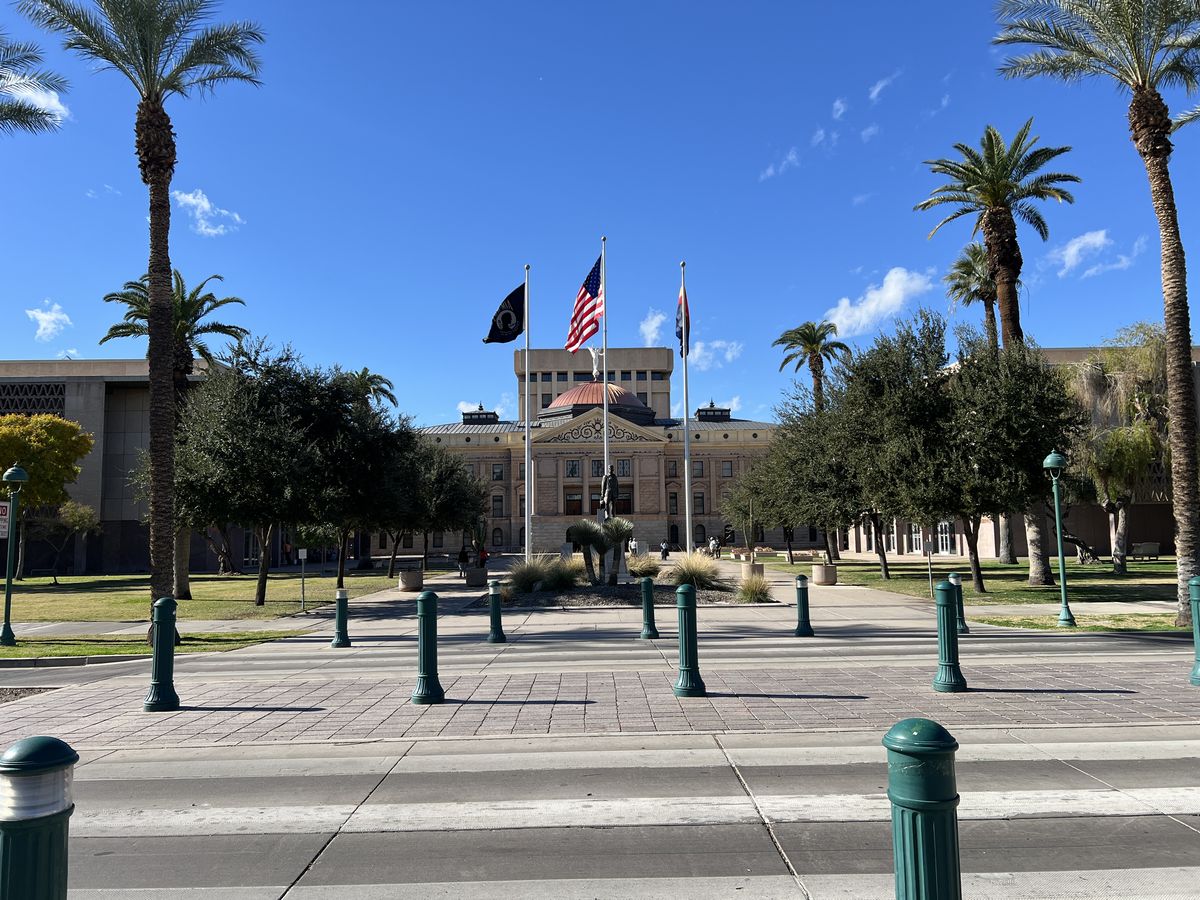|
|
 |
| |
|
Connection Newsletter
By AzHHA Communications ● Mar 07, 2024
Smart Brevity® count: 6.5 mins...1725 words
In this issue, read about:
- What’s next for HB2035.
- Latest updates on Change Healthcare cyberattack.
- Applications are open for the Transition to Practice Program.
|
| |
Legislative update: The first veto and the Arizona House goes to Israel

We are 60 days into the legislative session, during which we have witnessed the passing of three bills, with one bill signed into law and another vetoed.
- The first veto of the year occurred this week, concerning a contentious border bill (SB1231).
- Meanwhile, the House is experiencing a pause this week as 17 members are away on a trip to Israel.
- We anticipate that the chamber will be working extra hours next week to catch up on legislative matters.
Regarding HB2035, which focuses on health insurance accountability and is a priority legislation for AzHHA, it was recently assigned to both the Senate Health & Human Services and Senate Appropriations committees.
- The bill is estimated to have a $2.9 million impact on the general fund and necessitate the addition of three new full-time employees (FTEs).
- We are in ongoing discussions with the Arizona Department of Insurance and Financial Institutions to understand why there is now a need for three FTEs when none were required last year when the bill was initially proposed.
What's next: Regarding the double assignment, we have held meetings with the chairs of both committees and have received assurances that they will review the bill.
- Based on our discussions, we anticipate that the bill will be included on the agendas of both committees next week.
- Each committee meets on Tuesdays at 2 p.m.
Reach out to Damien Johnson, AzHHA director of government relations, with any questions or if you would like more information regarding any legislation.
|
| |
Latest updates on Change Healthcare cyberattack

On Monday, March 4, 2024, AzHHA met with member CEOs and Carmen Heredia, director for the Arizona Health Care Cost Containment System (AHCCCS), to discuss how the recent cyberattack on Change Healthcare may have impacted them.
- Local FBI representatives also joined the call.
- AzCHER continues to actively monitor the situation.
- AzHHA sent AHCCCS a letter on Wednesday, March 6, 2024 requesting assistance to mitigate the fallout. Read it here.
Additionally, the Department of Health and Human Services announced flexibilities from the Centers for Medicare & Medicaid Services (CMS) to aid providers affected by the cyberattack on Change Healthcare.
- CMS measures include expedited clearinghouse changes for Medicare providers, guidance for Medicare Advantage and Part D sponsors to ease authorization requirements, and encouragement for Medicaid managed care plans to adopt similar measures.
- Hospitals facing cash flow disruptions are advised to request accelerated payments.
- Change Healthcare disclosed the cyberattack on Wednesday, Feb. 21, 2024, attributed to threat actor ALPHV Blackcat.
If you have any further inquiries or would like to share updates about your situation related to this cyberattack, please contact Amy Upston at [email protected].
|
| |
Arizona Transition to Practice Program: Apply now for the June 2024 cohort!
Applications are now open for the second Arizona Transition to Practice Program for New Graduate Registered Nurses cohort beginning in June 2024.
- Any Arizona healthcare facility licensed by the Arizona Department of Health Services that hires new graduate registered nurses can apply.
- Priority will be given to critical access hospitals or hospitals located in counties with a population of less than 500,000 people.
- Hospitals with existing 12-month Transition to Practice programs are not eligible.
Why it matters: The Arizona Transition to Practice Program:
- Supports and develops new nurses.
- Provides evidence-based professional development.
- Accelerates the novice nurse to a competent nurse more rapidly.
- Addresses resilience and emergency preparedness.
👉Apply now! Applications are due Friday, April 12, 2024.
|
| |
AzHHA submits comment letter on Differential Adjusted Payments
What’s new: Last week, AzHHA submitted comments on the Contract Year Ending 2025 (Oct. 1, 2024-Sept. 30, 2025) Differential Adjusted Payments (DAP). The Arizona Health Care Cost Containment System (AHCCCS) preliminary public notice can be found here.
- A final notice is expected later this month.
Why it matters: Hospitals and other providers may receive an additional increase of 0-10.5% on all AHCCCS inpatient and outpatient payments related to DAP initiatives. The amount for DAP payments and what needs to be completed to obtain them gets updated every year.
What they're saying: AzHHA provided suggested improvements to AHCCCS’ current proposal including:
- Instead of eliminating payments for behavioral health hospitals associated with the Inpatient Psychiatric Facility Quality Reporting (IPFQR) Program as proposed by AHCCCS, AHCCCS should either find another measure or phase out the IPFQR DAP initiative.
- AHCCCS could consider adjusting the timing of the Statement of Work for the Crisis Bed Registry to Monday, April 1, 2024, or later and adjust the milestones so more behavioral health hospitals could participate in this initiative.
- The requirement for the Social Determinants of Health Closed Loop Referral Platform should be reduced for hospitals that see less than 1,200 patients a year.
- If AHCCCS is unable to continue DAP at the same level for hospitals, it should consider implementing a corresponding increase for HEALTHII base payments.
|
| |
Jumanji Too functional exercise virtual training
The Jumanji Too Functional/Full Scale Exercise (FSE) is taking place on Wednesday, May 8, 2024 (virtual). To ensure accurate and successful exercise play, please carefully complete registration at this link, and double check that all answers are free of errors prior to submission.
Collaboration with Federal Emergency Management Agency National Exercise Division
- The AzCHER 2024/Functional/Full-Scale Exercise will enhance critical healthcare partnerships, healthcare provider organizations’ preparedness and response capabilities for large-scale system disruptions and build healthcare system resilience.
- Registration is now open.
- If you have any questions please reach out to Mary Douglass or
Dawn Irons.
|
| |
Arizona Department of Health Services launches interactive public health tool
The Arizona Department of Health Services (ADHS) launched the Arizona Social Vulnerability Index (AZSVI), a new initiative of the Arizona Health Improvement Plan (AzHIP) Data Advisory Committee.
- Developed in collaboration with Arizona State University, the ADHS Geographical Information Systems office and the ADHS Office of Health Equity, AZSVI offers interactive data through a storymap.
- The tool allows users to explore Arizona communities' strengths, download data and assess factors impacting public health.
- It aims to address disparities and promote equity among the Arizona public health workforce, healthcare providers, policymakers and the general public. Access the AZSVI storymap here.
- Additional resources, including an FAQ document and a demo video on data download, will be available on the webpage later this spring.
- For inquiries, contact [email protected].
|
| |
Patient Safety Awareness Week
March 10-16 is Patient Safety Awareness Week.
- Join the Centers for Disease Control and Prevention (CDC) in celebrating Patient Safety Awareness Week next week.
- Share how you work to protect the health and safety of your patients by using the hashtags #PatientSafety and #PSAW24 on your favorite social media channels.
Why it matters: Recognizing Patient Safety Awareness Week is crucial as it emphasizes our collective responsibility to ensure the health and safety of patients, fostering a culture of care and promoting open discussions about patient safety.
Go deeper: Join experts from CDC’s Division of Healthcare Quality and Promotion at two upcoming webinars where they’ll discuss insights into finding more patient-centered solutions for identifying and preventing patient harm in healthcare.
- Join CDC’s Mike Bell, MD, on Wednesday, March 13 for a discussion on improving communication between patients and providers for patient safety.
- Join the Centers for Medicare & Medicaid Services at the free public webinar titled “Quality Counts, Safety Matters: Prioritizing Patient Safety Through Quality Measurement,” on Thursday, March 21, featuring a special fireside chat with CDC’s Arjun Srinivasan, MD.
|
| |
Congress unveils new spending bills

The House and Senate Appropriations Committees unveiled six appropriation bills for the remainder of the fiscal year, covering various federal agencies, with House consideration slated for Wednesday, March 6, 2024.
- Another six bills, including those for labor, health and human services, are anticipated soon for a vote before the Friday, March 22, 2024 deadline.
- The healthcare extender package, announced recently, offers relief from Medicaid DSH payment cuts, extends vital rural Medicare programs and mitigates physician fee reductions.
- Notably, it excludes site-neutral hospital cuts and price transparency measures.
Key highlights of the package include preserving Medicaid DSH funding for FY 2024 and delaying cuts for FY 2025, extending Medicare rural hospital programs through December 2024, and providing partial relief for Medicare physician reimbursements.
- Workforce programs like Community Health Centers and National Health Service Corps are extended.
- Additionally, Medicaid coverage for behavioral health services would expand, and offsets include reductions in Medicare and Medicaid improvement funds.
Yes, but: The legislation does not include site-neutral payment cuts or changes to hospital price transparency rules.
- Although the Pandemic and All-Hazards Preparedness Act wasn't reauthorized, funding for related programs is extended.
- Centers for Medicare & Medicaid Services receives additional funding for quality measure activities.
- The appropriations bills cover agencies like agriculture, commerce, energy, interior, military construction, transportation and housing.
|
| |
April 4-5 - 2024 Arizona Healthcare Workforce Summit
Join the Second Annual Arizona Healthcare Workforce Summit and support statewide healthcare workforce collaboration. With an influx of funding to address statewide healthcare workforce development and many initiatives underway, the Summit will facilitate strategic collaboration and maximize our collective awareness and impact. Learn more and register.
April 11, 16 and 18 - COPD Educator Course
This course, offered by the American Lung Association, will include practical information healthcare professionals can use in their work to provide guidelines-based care and help patients with chronic obstructive pulmonary disease (COPD) understand how to manage their disease. See additional details and register now.
Thursday, May 30 - Introduction to POLST
Join physician orders for life-sustaining treatment paradigm (POLST) for their one-hour virtual workshops equipping healthcare professionals with knowledge and resources to begin using POLST in Arizona. Register here.
|
| |
|
|
| |
|
Share your feedback! Email [email protected].
|
|